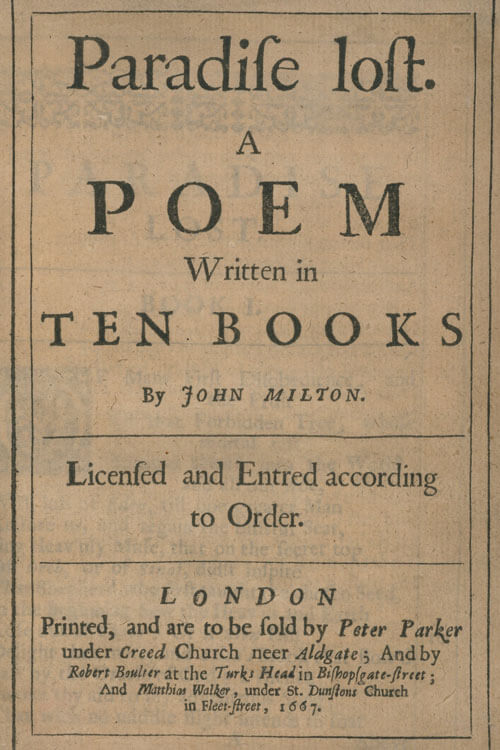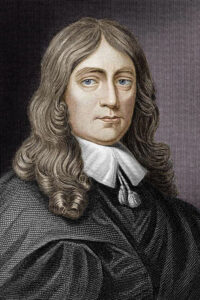
Paradise Lost
His words here ended, but his meek aspect was Silent yet spake and breathed immortal love To mortal men, above which only shone Filial obedience: as a sacrifice
Glad to be offered, he attends the will of his great Father. Admiration seized All Heaven, wondering what this might mean and where it tends, but soon th’ Almighty thus replied.
O thou, in Heaven and Earth, the only peace Found out for mankind under wrath, O thou, my sole complacency! Well, thou knowest how dear to me are all my works; nor Man the least, Though last created, that for him I spare Thee from my bosom and right hand, to save, By losing thee a while, the whole race lost.
Read or download Book
John Milton
John Milton (9 December 1608 – 8 November 1674) was an English poet and intellectual.
Biography.
His 1667 epic poem Paradise Lost, written in blank verse and including over ten books, was written in a time of immense religious flux and political upheaval. It addressed the fall of man, including the temptation of Adam and Eve by the fallen angel Satan and God’s expulsion of them from the Garden of Eden. Paradise Lost elevated Milton’s reputation as one of history’s greatest poets. He also served as a civil servant for the Commonwealth of England under its Council of State and later under Oliver Cromwell.
Milton achieved fame and recognition during his lifetime; his celebrated Areopagitica (1644), written in condemnation of pre-publication censorship, is among history’s most influential and dynamic defences of freedom of speech and freedom of the press. His desire for freedom extended beyond his philosophy and was reflected in his style, which included introducing new words (coined from Latin and Ancient Greek) to English. He was the first modern writer to employ unrhymed verse outside the theatre or translations.
Milton is described as the “greatest English author” by biographer William Hayley, and he remains generally regarded “as one of the preeminent writers in the English language”. However, critical reception has oscillated in the centuries since his death, often due to his republicanism. Samuel Johnson praised Paradise Lost as “a poem which … concerning design may claim the first place, and concerning performance, the second, among the productions of the human mind”, though he (a Tory) described Milton’s politics as those of an “acrimonious and surly republican”. Milton was revered by poets such as William Blake, William Wordsworth, and Thomas Hardy.
Phases of Milton’s life parallel the major historical and political divisions in Stuart England at the time. In his early years, Milton studied at Christ’s College, Cambridge. Then he travelled, wrote poetry primarily for private circulation, and launched a career as a pamphleteer and publicist under Charles I’s increasingly autocratic rule and Britain’s breakdown into constitutional confusion and, ultimately, civil war. While once considered dangerously radical and heretical, Milton contributed to a seismic shift in accepted public opinions during his life that eventually elevated him to public office in England. The Restoration of 1660 and his loss of vision later deprived Milton much of his public platform, but he used the period to develop many of his significant works.
Milton’s views developed from extensive reading, travel, and experience that began with his days as a student at Cambridge in the 1620s and continued through the English Civil War, which started in 1642 and continued until 1651. By his death in 1674, Milton was impoverished and on the margins of English intellectual life but famous throughout Europe and unrepentant for political choices that placed him at odds with governing authorities.
Study, poetry, and travel
John Milton was born in Bread Street, London, on 9 December 1608, the son of composer John Milton and his wife Sarah Jeffrey. The senior John Milton (1562–1647) moved to London around 1583 after being disinherited by his devout Catholic father, Richard “the Ranger” Milton, for embracing Protestantism. In London, the senior John Milton married Sarah Jeffrey (1572–1637) and found lasting financial success as a scrivener. He lived in and worked from a house in Cheapside at Bread Street, where the Mermaid Tavern was located. The elder Milton was noted for his skill as a composer of music, and this talent left his son with a lifelong appreciation for music and friendships with musicians such as Henry Lawes.
Milton’s father’s prosperity allowed his eldest son to obtain a private tutor, Thomas Young, a Scottish Presbyterian with an MA from the University of St Andrews. Young’s influence also served as the poet’s introduction to religious radicalism. After Young’s tutorship, Milton attended St Paul’s School in London, where he began the study of Latin and Greek; the classical languages left an imprint on both his poetry and prose in English (he also wrote in Latin and Italian).
Milton’s first datable compositions are two psalms written at age 15 at Long Bennington. One contemporary source is Brief Lives of John Aubrey, an uneven compilation that includes first-hand reports. In the work, Aubrey quotes Christopher, Milton’s younger brother: “When he was young, he studied very hard and sat up very late, commonly till twelve or one o’clock at night.” Aubrey adds, “His complexion exceedingly fair—he was so faire that they called him the Lady of Christ’s College.”






